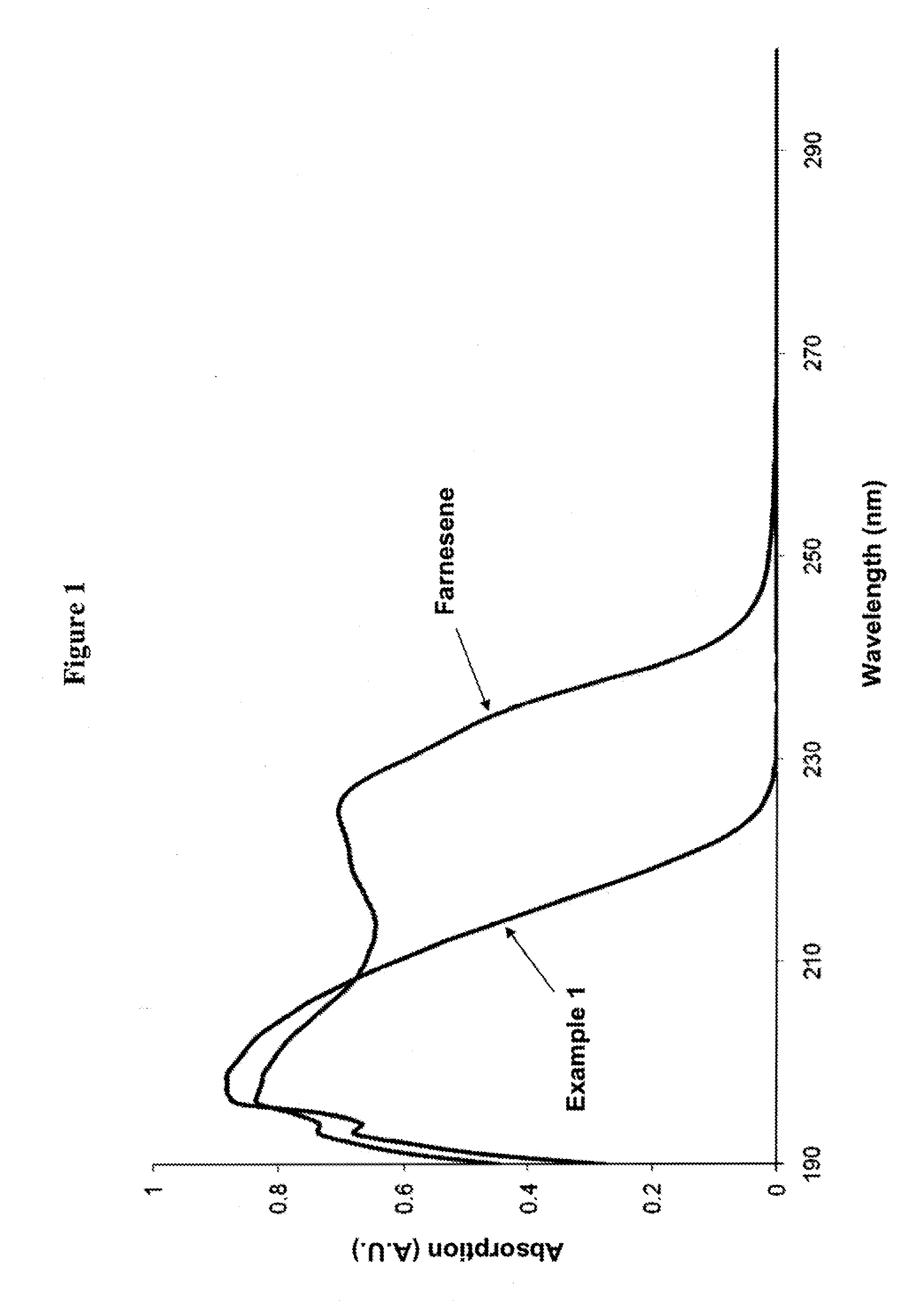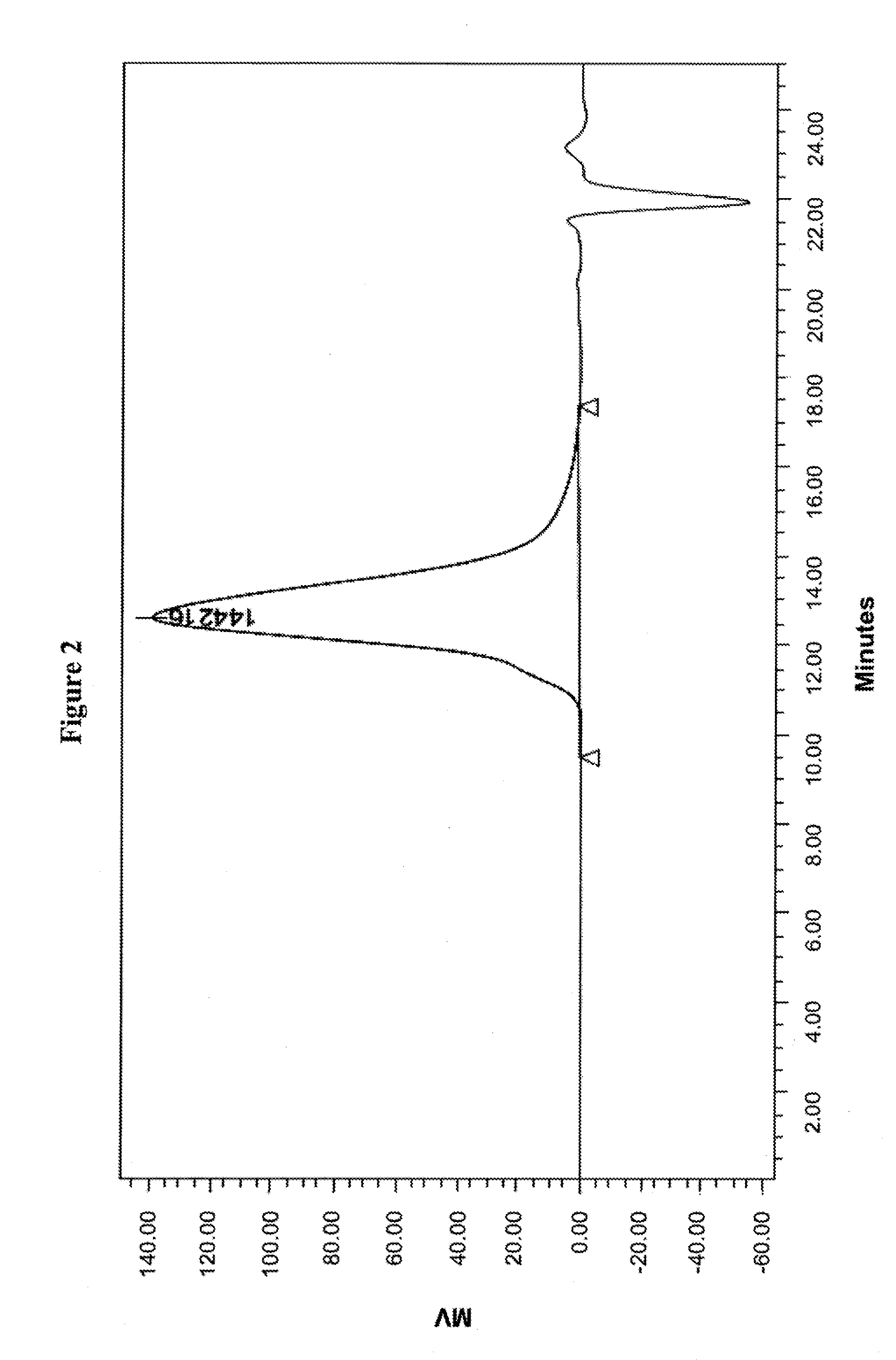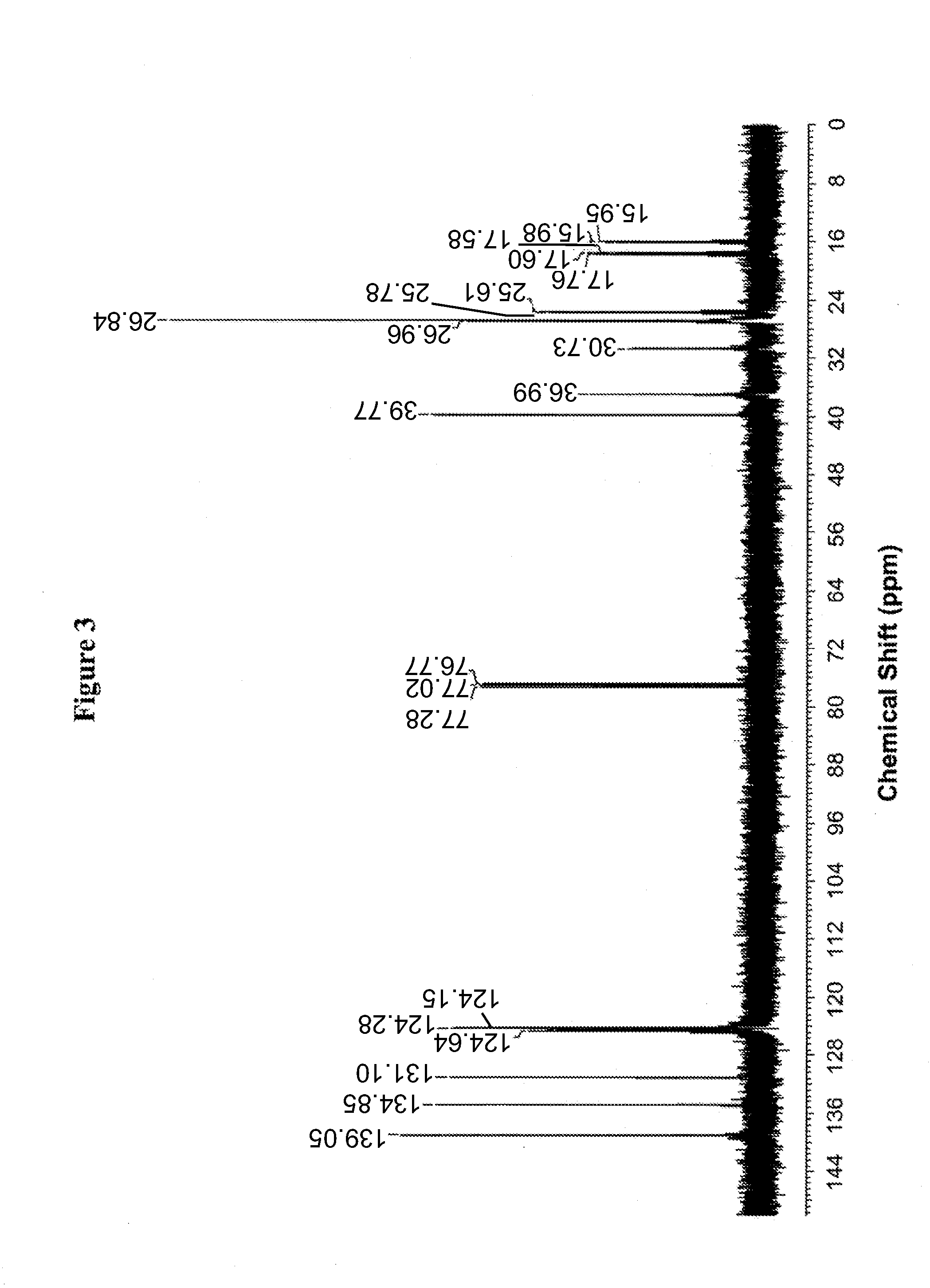Compositions comprising a farnesene interpolymer
a technology of farnesene and polymer, which is applied in the direction of hydrocarbons, hydrocarbon purification/separation, synthetic resin layered products, etc., can solve the problem of rare terpene or isoprenoid compound polymerization in adhesive compositions
- Summary
- Abstract
- Description
- Claims
- Application Information
AI Technical Summary
Benefits of technology
Problems solved by technology
Method used
Image
Examples
example 1
1,4-polyfarnesene Having a Mn of 105,000
[0228]To a dried three-neck reactor under argon atmosphere, a pre-dried solution comprising 92.29 g of β-farnesene in 13.7% in cyclohexane was added. n-Butyl lithium (1.85×10−3 mol, obtained from Acros, Morris Plains, N.J.) was added into the reactor as an initiator, and the reactor was heated at about 50° C. for about 19 hours, until all β-farnesene was consumed, monitored by UV-Vis spectroscopy. Example 1 was precipitated from the reaction mixture with a 1% solution of ethanol and t-butyl catachol (obtained from Sigma-Aldrich, St. Louis, Mo.). After drying in a vacuum oven at about 60° C. for about 2 hours, Example 1 was kept under vacuum for about 16 hours. Afterwards, Example 1, collected at 89.83 g (yield 97%), was stored in a refrigerator to prevent any crosslinking before characterization.
[0229]The progress of synthesizing Example 1 was monitored by the disappearance of β-farnesene, as measured by UV-Vis in the reaction mixture. FIG. 1 ...
example 2
1,4-polyfarnesene Having a Mn of 245,000
[0237]Example 2 is a 1,4-polyfarnesene having a Mn of about 245,000 g / mol. Example 2 was synthesized similarly according to the procedure for Example 1, except sec-butyl lithium was used as the initiator. The net weight of Example 2 was found to be 83.59 g (yield 71.4%). The yield is lower because aliquots were removed to monitor the progression of the reaction.
[0238]The molecular weight and polydispersity of Example 2 were determined by GPC. FIG. 9 shows the GPC curve of Example 2. The Mn, Mw, Mp, Mz, Mz+1, polydispersity, Mz / Mw, and Mz+1 / Mw of Example 2 are shown in Table 2. The number of farnesene units in Example 2 was calculated to be about 2000. Because of the increased molecular weight of Example 2, it had a higher level of entanglement and longer relaxation time than Example 1.
TABLE 2PropertiesExample 2Mn244,747 g / molMw457,340 g / molMp501,220 g / molMz768,187 g / molMz+11,132,362 g / mol Polydispersity1.868622Mz / Mw1.679684Mz+1 / Mw2.475971
[023...
example 3
3,4-polyfarnesene
[0241]Example 3 was synthesized similarly according to the procedure for Example 1 except that n-butyl lithium (1.71×10−3 mol) was added in the presence of N,N,N′,N′-tetramethylethylenediamine (1.71×10−3 mol, TMEDA, obtained from Sigma-Aldrich, St. Louis, Mo.). The net weight of Example 3 was found to be 82.72 g (yield 97%).
[0242]The molecular weight and polydispersity of Example 3 were determined by GPC. FIG. 12 shows the GPC curve of Example 3. The two peaks in FIG. 12 indicated that two distinct weight fractions formed in Example 3. The Mn, Mw, Mz, Mz+1, polydispersity, Mz / Mw, and Mz+1 / Mw of Example 3 are shown in Table 3. The Mp of the first peak in FIG. 12 was about 97,165 g / mol. The Mp of the second peak in FIG. 12 was about 46,582 g / mol. The number of farnesene units in Example 3 was calculated to be about 240.
TABLE 3PropertiesExample 3Mn45,818 g / molMw47,644 g / molMz49,134 g / molMz+150,527 g / molPolydispersity1.039844Mz / Mw1.031269Mz+1 / Mw1.060509
[0243]FIG. 13 sho...
PUM
| Property | Measurement | Unit |
|---|---|---|
| softening point | aaaaa | aaaaa |
| bulk density | aaaaa | aaaaa |
| bulk density | aaaaa | aaaaa |
Abstract
Description
Claims
Application Information
 Login to View More
Login to View More - R&D
- Intellectual Property
- Life Sciences
- Materials
- Tech Scout
- Unparalleled Data Quality
- Higher Quality Content
- 60% Fewer Hallucinations
Browse by: Latest US Patents, China's latest patents, Technical Efficacy Thesaurus, Application Domain, Technology Topic, Popular Technical Reports.
© 2025 PatSnap. All rights reserved.Legal|Privacy policy|Modern Slavery Act Transparency Statement|Sitemap|About US| Contact US: help@patsnap.com



